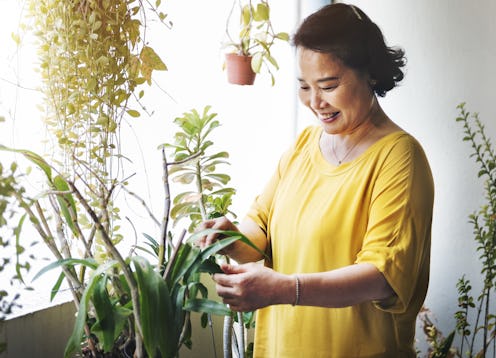Life
Science Says Being A Plant Mom Can Boost Your Physical Health

When people need a break from the hustle and bustle of their day-to-day lives or busy work schedules, many turn to Mother Earth to recenter themselves and relax. Whether you're hiking, tending to plants in a garden, or simply soaking up sun at you local park, immersing yourself in nature can be extremely beneficial to your health. In fact, a recent study found that people with more exposure to "green space" tend to have better overall health, and that being in nature also reduced the risk of certain health issues, like type II diabetes or cardiovascular disease.
Unsurprisingly, bringing the green inside your home — in the form of houseplants, potted succulents, or colorful flowers — can also promote your health and overall wellness. You probably already know that transforming your apartment into a botanical retreat can boost your mood, and tending to your leafy friends can help you de-stress after a long day. However, did you know the benefits of having indoor plants go way beyond your mental health? Here are seven ways that science has shown houseplants can also impact your physiological and physical health for the better.
1They Can Clear Toxins From The Air
Getting a breath of fresh, clean air doesn't require you take a backpacking trip way out in the middle of nowhere. As NBC News reported, research conducted by NASA has found that indoor plants can remove up to 87 percent of toxins in air and water within 24 hours of being in your home or apartment. How? The research revealed houseplants pull polluted air down to their roots, and convert it into food and energy. Breathing in particles and pollution can be detrimental to your health, and simply by having houseplants you're purifying the air in your apartment.
2They Can Suppress Your Fight Or Flight Response
Your autonomic nervous system (ANS) is responsible for much of your involuntary bodily functions — including digestion, heart rate, emotional responses, metabolism, blood pressure, temperature, and more. Your ANS has three main branches: Your sympathetic system (aka, the system that regulates your fight or flight response), parasympathetic system (aka, rest and digest), and enteric system, which is only in your gastrointestinal tract. A 2015 study showed that interacting with houseplants actually suppressed the sympathetic nervous system in young adults; meaning, working the plants calmed stress and lowered blood pressure. Extremely cool.
3They Can Reduce Fatigue
If your home office or cubicle at work is feeling dull, buying plants will not only help make your space feel more colorful, but it can help combat your midday fatigue. As the Daily Mail reported in 2011, a study conducted by researchers from the Norwegian University of Life Sciences, and Uppsala University in Sweden, found having greenery in your workspace can actually reduce fatigue.
4They Can Soothe Headaches & Sore Throats
The same study that showed green, leafy plants can help with fatigue also found that study participants reported fewer headaches, coughs, dry throat issues, and dry skin. Seriously: It's time to hit up your local greenhouse or browse Amazon for indoor plants that you can put in your office to improve your physical health at work. Specifically, if dry skin or throat problems is a chronic issue for you, investing in a Boston Fern — which acts as a natural humidifier — could be helpful.
5They Can Reduce Allergies
Having plants (and their pollen) in your apartment may seem counterproductive for those of us with allergies, but there are hypoallergenic plants that can actually reduce allergy symptoms. This is because they clear the air of dust and pollution. From Peace Lily to Gerber Daisies, keeping certain plants in your home could be an easy tool to stop your sniffles — even in the midst of allergy season.
6They Can Reduce Physical Pain
A 2009 study discovered that patients recovering from surgery who had hanging plants in their hospital rooms reported lower levels of physical pain, anxiety, fatigue, and stress, than those without. What's more, as The New York Times reported in 2015, another study showed patients recovering from appendectomies took fewer painkillers when there were plants in their hospital rooms.
7They Might Even Help You Live Longer
Simplemost reported last year that a 2016 study found that women who surrounded themselves with vegetation — both indoors and outdoors — had a 12 percent lower mortality rate than women who lived in areas farther from nature. According to a press release from the Harvard T.H. Chan School of Public Health, "Women living in areas with the most vegetation had a 34 percent lower rate of respiratory disease-related mortality, and a 13 percent lower rate of cancer mortality compared with those with the least vegetation around their homes."
Even if you don't have a green thumb, there are certain kinds of houseplants that require little maintenance, and that won't die if you forget to water them one day. You can experience both mental and physical health benefits by filling your apartment, workspace, or both with indoor plants.